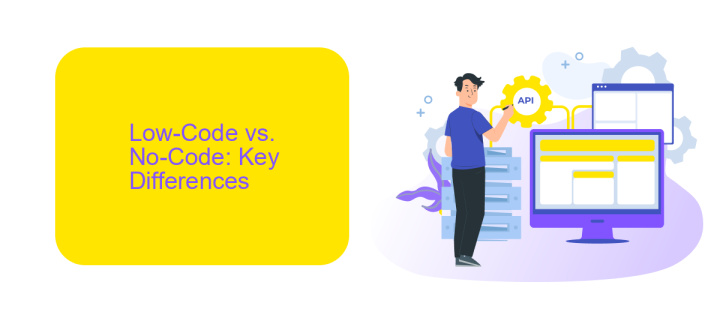Low-Code No-Code Development Service
In today's rapidly evolving digital landscape, Low-Code No-Code (LCNC) development services are revolutionizing the way businesses create and deploy applications. By enabling users to design, build, and launch software solutions with minimal to no coding expertise, LCNC platforms empower organizations to accelerate innovation, reduce costs, and bridge the gap between IT and business teams. Discover how LCNC is transforming the future of development.
Introduction
Low-Code No-Code Development Service is revolutionizing the way businesses approach software development. These platforms allow users to create applications with minimal coding knowledge, significantly reducing development time and costs. By enabling non-technical users to build and deploy applications, organizations can achieve greater agility and innovation.
- Accelerated development process
- Reduced dependency on IT departments
- Cost-effective solutions
- Enhanced collaboration between teams
One of the key advantages of Low-Code No-Code platforms is their ability to integrate with various services seamlessly. For instance, ApiX-Drive offers a robust solution for setting up integrations without coding skills. This allows businesses to automate workflows and connect different applications effortlessly, further enhancing productivity and efficiency. As a result, companies can focus more on strategic initiatives rather than getting bogged down by technical complexities.
Low-Code vs. No-Code: Key Differences

Low-code and no-code development platforms both aim to simplify the software development process, but they cater to different needs. Low-code platforms provide a more flexible environment that allows developers to write some code when necessary, making it ideal for complex applications that require custom functionality. These platforms are designed for users with some programming knowledge who need to accelerate the development process without starting from scratch.
No-code platforms, on the other hand, are tailored for users with little to no programming skills. They offer a more user-friendly interface with drag-and-drop features, enabling business professionals to create applications quickly. While no-code platforms are excellent for simple applications and prototypes, they might lack the customization capabilities of low-code solutions. For instance, services like ApiX-Drive can be easily integrated into both low-code and no-code platforms, providing seamless data synchronization and automation without the need for extensive coding.
Benefits of Low-Code/No-Code Development

Low-code and no-code development platforms offer numerous advantages that significantly streamline the software development process. These platforms empower users with little to no coding expertise to create functional applications, thereby democratizing software development and reducing dependency on skilled developers.
- Speed and Efficiency: These platforms accelerate the development process by providing pre-built templates and drag-and-drop functionalities, allowing for rapid prototyping and deployment.
- Cost-Effective: Reducing the need for a large team of developers, these solutions lower overall project costs and make software development more accessible to small businesses.
- Flexibility: Users can easily modify and update applications without extensive coding knowledge, ensuring that the software can evolve with changing business needs.
- Enhanced Collaboration: By enabling non-technical team members to participate in the development process, these platforms foster better collaboration and alignment within the organization.
- Integration Capabilities: Services like ApiX-Drive facilitate seamless integration with various third-party applications, ensuring that the new software can work harmoniously within existing ecosystems.
In conclusion, low-code and no-code development platforms provide a robust solution for quickly and cost-effectively building applications. They not only enhance productivity and collaboration but also offer the flexibility to adapt to evolving business requirements, making them an invaluable asset in today's fast-paced digital landscape.
Challenges and Limitations of Low-Code/No-Code

While Low-Code/No-Code (LCNC) development platforms offer numerous advantages, they also come with their own set of challenges and limitations. One primary concern is the potential for limited customization, as these platforms may not provide the same level of flexibility as traditional coding methods. This can restrict the ability to create highly specialized or complex applications.
Another significant issue is the dependency on the platform provider. If the provider changes their policies, pricing, or discontinues the service, it could severely impact businesses relying on their platform. Additionally, LCNC platforms may not always be able to handle large-scale enterprise applications due to scalability constraints.
- Limited customization options
- Dependency on platform provider
- Scalability issues
- Security concerns
Moreover, integrating LCNC applications with other systems can be challenging. While services like ApiX-Drive can facilitate integration by automating data transfer between applications, not all LCNC platforms may support such integrations seamlessly. Therefore, it is crucial to thoroughly evaluate these platforms' capabilities and limitations before committing to their use.


Future of Low-Code/No-Code Development
The future of low-code/no-code development is poised for significant growth and transformation. As businesses increasingly seek agility and faster time-to-market, these platforms will become essential tools for innovation. They empower non-technical users to create and deploy applications, reducing the dependency on traditional software development cycles. This democratization of software development is expected to lead to a surge in new applications, as more people can bring their ideas to life without extensive coding knowledge.
Moreover, the integration capabilities of low-code/no-code platforms will continue to expand. Services like ApiX-Drive, which facilitate seamless integration of various applications and services, will play a crucial role in this evolution. By enabling easy data flow between disparate systems, ApiX-Drive and similar tools will enhance the functionality and interoperability of low-code/no-code solutions. This will not only streamline business processes but also foster a more connected and efficient digital ecosystem, driving further adoption and innovation in the low-code/no-code space.
FAQ
What is Low-Code No-Code Development?
Who can benefit from Low-Code No-Code platforms?
Can Low-Code No-Code platforms integrate with other software?
Are Low-Code No-Code platforms secure?
What are the limitations of Low-Code No-Code Development?
Apix-Drive is a simple and efficient system connector that will help you automate routine tasks and optimize business processes. You can save time and money, direct these resources to more important purposes. Test ApiX-Drive and make sure that this tool will relieve your employees and after 5 minutes of settings your business will start working faster.

